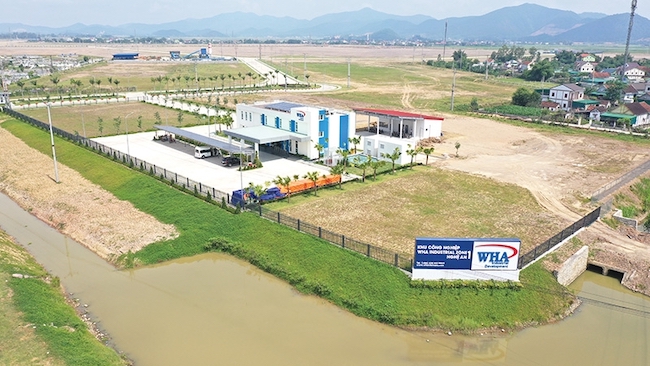Business
WHA continuing to expand in Vietnam as strategic initiative after Covid-19
David Nardone, group executive - industrial and international, WHA Industrial Development Plc believes that the opportunities in Vietnam are substantial and attractive, especially after its effective response to the Covid-19 pandemic.

Companies are moving production out of China due to its trade war with the U.S. and the Covid-19 pandemic. In that context, Vietnam has been seen as a potential destination for factories to relocate.
David Nardone, group executive - industrial and international, WHA Industrial Development Plc. says that, companies are relocating some portion of their manufacturing process to access the growing markets in Vietnam and its surrounding countries as well as an export base.
Business coming from China, whether it is Chinese, American, Japanese, or others will be significant to Vietnam in considering the differences in the sizes of their economies.
He believes that the opportunities in Vietnam are substantial and attractive for a host of reasons including a well-educated labor base, the central government and provinces being investor friendly, and improving infrastructure, all with reasonable costs.
However, he notes that investors are looking for clear rules and regulations, a welcoming environment with ease of business, and a predictable timeframe for investment approvals.
“WHA is continuing to expand in Vietnam as our strategic initiative”, says Nardone.
Effective crisis management and preparation to rebound
The Covid-19 pandemic has negatively influenced enterprises in Vietnam in particular and those in the world. WHA Vietnam is not exception.
Several small difficulties at WHA Vietnam relate to being unable to travel, reach the customers that need to visit its industrial zone from overseas. Fortunately, WHA team in Vietnam has really excelled to be independent and highly capable.

Nardone shares that WHA put in place the same global standards for health and risk management that it used in Thailand immediately. Social distancing, segregation of operating teams, protecting its customer infrastructure are some.
The the first project of Thailand’s WHA Group in Vietnam (WHA Industrial Zone 1 in Nghe An province) has effectively deployed a business continuity plan soon after Prime Minister Nguyen Xuan Phuc declared the Covid-19 outbreak an epidemic on February 1 in order to minimize disruptions caused by the Covid-19 pandemic.
It immediately formed a crisis management team conducting four main tasks to protect employees and support its customers and partners.
The first is assessing the situation and the new developments daily. The second is initiating adequate actions to mitigate risks for the company’s employees, customers and business partners. The third is ensuring deployment of enough resources where and when needed. The final one is coordinating all remedial actions.
The crisis management team put in place a series of protective measures, including employee travel restrictions, social distancing, splitting critical workforce in different locations, temperature checks for employees and visitors, and frequent sanitizing of the company’s premises.
O n March 23, the company initiated a business continuity plan (BCP), aiming to prevent operational disruption and ensure delivery of products and services.
Under the plan, a specific team has been set up to support operations, with back-office capabilities for industrial development, logistics and utilities. The plan includes the protection of water facilities with routine disinfectant sprays and restrictive access, increasing inventory to protect the supply chain and avoiding business interruptions.
The company has enabled its employees to work home by providing them with permanent access to necessary data and software, and facilitated the use of the latest voice and video communication tools. The BCP also includes a disaster recovery solution.
"A practical BCP must not only minimize the impact of a crisis, but also help companies gain the trust of their investors, customers and business partners, as well as build a strong brand image," David Nardone added.
Set up in February 2017, the WHA Industrial Zone 1 had an initial area of 145 hectares, which in turn, is part of the 498-hectare Phase 1, now open to local and international investors. With a total area of 3,200 hectares upon completion, it will be one of the largest industrial zones in north central Vietnam.
Thai tycoon unveils strategy for largest industrial park in Vietnam
Maersk rolls out electric trucks for inland transport in Vietnam
A.P. Moller–Maersk will deploy a fleet of heavy-duty electric trucks for inland container transport in Vietnam starting in the first quarter of 2026.
Grab and Charge+ partner to develop electric vehicle charging network in Vietnam
The partnership aims to expand the system of charging and battery swapping stations, providing Grab driver-partners and other EV users with easy access to flexible and reliable charging solutions.
Samsung Vietnam appoints its first Vietnamese senior executive
Samsung Vietnam appoints Nguyen Hoang Giang to SEVT senior leadership, the first Vietnamese executive in the company’s local manufacturing units.
Michelin leads the smart mobility revolution with data and AI
Michelin is undergoing a strong transformation by applying AI and smart analytic, helping lead the smart, safe, and sustainable mobility revolution in the Industry 4.0 era.
LG Innotek secures $200 million IFC loan following revenue drop
LG Innotek Vietnam Hai Phong secured a $200 million IFC loan as revenue slows, aiming to expand camera module production while meeting sustainability targets.
Leading with empathy in Vietnam’s billion-dollar investment flows
For Koen Soenens, Sales and Marketing Director at DEEP C, empathy is a compass that guides major deals, the way a leader builds a team, and the ambition to create a sustainable industrial zone that carries a Vietnamese identity.











































